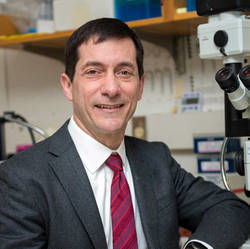Calls Now Open
2024 ADDF-Harrington + 2025 Harrington Scholar-Innovator Programs

Cardiovascular, Rare / Orphan
Promising Therapy for Inherited Heart Rhythm Disorders
2016 Harrington Scholar-Innovator
David Milan, MD, has a heart for children with long QT syndrome, a rare, congenital disorder. A type of abnormal heart rhythm, a long QT interval causes a fast, irregular heartbeat, fainting and an increased risk for sudden cardiac death.
“We can treat older patients with a defibrillator,” Dr. Milan explains. “But for kids, a defibrillator is a big deal. They will require multiple surgeries and multiple lead replacements during their lifetime.”
Treatment with beta blocker drugs can be effective, but comes with significant side effects, especially for children. A cardiologist and Assistant Professor of Medicine at Harvard Medical School, Dr. Milan says he always found heart rhythm disorders the most fascinating subspecialty in his field. He notes that numerous medical advances in diagnosing and treating heart rhythm disorders have been made in the past 10 years, but not for long QT syndrome.
As a researcher, Dr. Milan feels driven to find a treatment for these young patients. “That combination of research and patient care is what motivates me,” he stresses. “Seeing patients every day gives us an added kick in the pants to find a treatment and keeps us focused on translational research.”
Now, after years of studying long QT syndrome clinically and in the lab, he believes he may have a solution. The key may be a compound that prevents prolonged QT syndrome upstream from its origin. Dr. Milan and his team have identified a compound that first successfully blocked long QT syndrome in zebrafish and then in human stem cells in a test tube.
The pivot point, Dr. Milan recalls, was when his ever-skeptical post-doc fellow came to him and reported that the compound not only stopped the arrhythmia in rabbits, but he was unable to create an arrhythmia in animals treated with the compound.
A California native, Dr. Milan graduated from Stanford with a degree in chemistry and started his career as a pharmaceutical company chemist. In that role, he realized that the connection with patients was remote. “I wanted to interact with patients and see the fruits of my labor. That's what drove me to medical school,” he recalls.
Dr. Milan looks to 2014 Harrington Prize winner Hal Dietz, MD, as his personal role model. “He is an inspirational figure for me. He is very focused on drawing that connection between patients and research. Our roots are in basic discovery, but for me there is always a compelling need to help patients.”
Source: Article from 2015-16 Annual Publication.